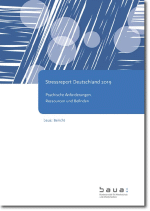Stress report Germany 2019
(in German)
In recent years, there has been an increased public interest in mental load and strain which is reflected, inter alia, in the clarification of the Occupational Safety and Health Act, in the latest work programs of the "Joint German Occupational Safety and Health Strategy" and the "Joint Declaration" of the BMAS and the social partners. In addition, the BAuA project "Mental Health in the Working World - Determining the Current State of Scientific Evidence" presented a systematic review of existing literature on the relationships between work-related mental load factors and their health consequences. Key factors, such as work intensity or working time, were identified, which should be primarily taken into account in the design of work. The Stressreport 2019 focuses on such key factors and provides information on their prevalence, their effects and their links with other work-related factors. The results are presented differentiated by age, gender, position, economic sector and occupation. It also describes changes for the period 2006-2018. The findings presented in the Stressreport are based on data from the 7th wave of the BIBB/BAuA employment survey 2018 (N = 20.2012), from the 2nd wave of the BAuA Working Time Survey 2017 (N = 9.552) and the 1st wave of the Study of Mental Health at Work (S-MGA; N = 4.511). Overall, despite slight declines, the work intensity remains at a high level and the proportion of people who simultaneously perceive it as burdensome and report recovery impairments has increased. The number of employees who often have job control has declined slightly since 2006. However, the proportion of full-time employees with long and excessively long working hours, which is due to health impairments as well as an increased frequency of accidents at work and reduced recovery, is almost stable. The same applies to shift and weekend work. Likewise, on-call services, which affect just under one-fifth of the workforce, are accompanied by a reduction in mental health. Around a quarter of the employees are also affected by mobile work. One in five employees indicates a reduction in rest periods, which cannot be recommended from an occupational science perspective. However, it can be shown that time control in the context of working time variables has positive effects. The report also shows that restructuring processes and related information deficits are often associated with health impairments. In this context, there is potential for improvement in the provision of adequate information to employees about change processes. In addition, there are also opportunities for optimisation in supportive leadership, although the working conditions of managers must also be taken into account. Action is still needed in the working conditions in the care sector, but also in the so-called simple work, which is presented here using the example of the logistics industry. In addition, it can be shown that early work design measures can contribute to the preservation of health and participation in working life for people with longer-term illnesses who, compared to other employees, assess their work situation more unfavourably overall.
Please download the complete report "Stress report Germany 2019" (in German only).
Bibliographic information
Title: Stressreport Deutschland 2019 - Psychische Anforderungen, Ressourcen und Befinden.
1. edition.
Dortmund:
Bundesanstalt für Arbeitsschutz und Arbeitsmedizin, 2020.
ISBN: 978-3-88261-259-2, pages: 225, paper, PDF file, DOI: 10.21934/baua:bericht20191007
